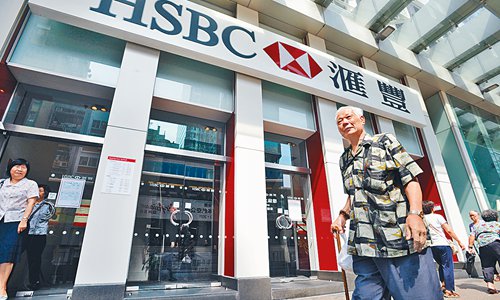HSBC Life becomes first to buy out partner in mainland unit
By Yin Yeping Source:Global Times Published: 2020/5/5 19:38:40

People pass by a HSBC bank in Hong Kong in February. Photo: IC
HSBC Holdings announced on Monday that its indirect subsidiary in Asia HSBC Insurance (Asia) will buy out the 50-percent stake in HSBC Life Insurance Co (HSBC Life China), its life insurance joint venture in China, from the company's life assurance partner in China National Trust, making HSBC Life the first foreign life assurance entity in the Chinese mainland to move from a joint venture to a sole proprietorship.
Industry experts said that the case highlights the opening-up of China's financial sector and signals the prospect of more foreign-owned insurance companies doing business in the country.
HSBC Life China, based in Shanghai, was set up in 2009 as a 50:50 joint venture between HSBC and National Trust, according to public information.
The Global Times learned that HSBC Life China will be the second wholly owned assurance company by a foreign entity after the US insurance firm AIA Group.
China's insurance market has become one of the world's largest with continuous expansion, industry analysts said.
Last year, the total assets of insurance companies in China rose 12.2 percent to 20.6 trillion yuan ($291 billion). The total assets of life insurance companies reached 17 trillion yuan, up 16.1 percent from the beginning of the year, the CBIRC said in February.
"The Chinese insurance market is very attractive to foreign investors. China has a large population and is gradually becoming an aging society, which is definitely a great attraction for foreign enterprises," said Hong Tao, director of the Institute of Business Economics at Beijing Technology and Business University. These trends will also encourage more foreign insurance companies to enter the Chinese market as sole proprietorships, injecting new vitality into the market.
Hao Yansu, a professor at the School of Insurance of the Central University of Finance and Economics, said that more foreign insurance companies will choose to enter China using a sole proprietorship, because there are differences in business philosophy between China and the West, and foreign companies want to manage their companies in their own way.
However, Hao said that he does not expect the company's change of ownership to make much difference to the mature domestic market.
"In the life insurance sector alone, local insurers account for more than 90 percent of the market, with strong competitiveness on a world level," Hao said.
"Also, since the cycle of life insurance is very long with an average of 20 to 30 years, many Chinese people are more inclined to choose local insurance financial institutions because of their usage habits and risk aversion," he said.